The beauty of adjustability
Purposeful power bases play many roles in today’s bedroom—from utilitarian medical device to high-tech tool to elegant design statement.
A lot of products claim to offer something for everyone. In the case of adjustable or power bases, it’s truer today than ever before. The adjustable base, which has been around for decades, began as a way to provide comfort to those in hospitals or other medical settings. Today, lifestyle adjustable bases range from attractive, high-end furniture looks with built-in Bluetooth to simple head-up bases that provide comfort to those who have medical needs such as sore backs, acid reflux or breathing problems. Most agree these bases offer a real service to people who want a comfortable night’s sleep.
Powering through
The once-exclusive adjustable base has experienced a boom in recent years. According to the ISPA 2015 Mattress Industry report, the number of motion bases sold by U.S. mattress manufacturers grew from 320,723 in 2011 to 966,041 in 2015, a 24.3% increase. (This number does not include bases imported directly by retailers.)
Phil Sherman, co-principal of Customatic Adjustable Bedz headquartered in Natick, Massachusetts, attributes this growth to some of the bigger manufacturers deciding to focus on building adjustable bases that worked better in the home, as well as the rise in popularity of foam and latex mattresses. Those lend themselves to adjustability, he says, although many innerspring mattresses also can be made adjustable-friendly.
Many agree that placing the foundations on the retail floor (they don’t take up any extra space, after all) and retail sales associates’ growing comfort with the product also are making a difference. Consumer awareness is growing, says Jay Thompson, president of Carthage, Missouri-based Leggett & Platt Adjustable Bed Group.

The Prodigy base, created by Carthage, Missouri-based Leggett & Platt Adjustable Bed Group, draws consumers with a touchscreen remote control with programmable positions and anti-snore button, adjustable-height legs and MicroHook retention system.
Recent research by the Better Sleep Council, the consumer-education arm of the International Sleep Products Association, bears this out. According to the research, 9% of consumers own an adjustable base and 33% say they are familiar with it and would consider purchasing one.
However, more can be done.
“I do believe the attachment rate is still a single-digit number, percentage-wise,” Thompson says. “I believe it can grow.”
Johnny Griggs, chief operating officer of Goleta, California-based Ergomotion/Softide from Jiaxing Shufude Electric Bed Co. Ltd., also looks forward to more growth. “We’ve seen such a huge change. It’s certainly the fastest growing category in the bedding industry, I’m sure,” he says. That’s good news for all adjustable base manufacturers.
Lisa Tan, chief marketing officer for Bloomfield Hills, Michigan-based Reverie/Ascion LLC, agrees. “There really is something for every consumer out there that involves power,” she says. “I envision a world in the not-so-distant future where the traditional flat foundation really will have seen its heyday.”
The ‘wow’ factor
The last few years have seen dramatic changes in the number and types of features offered with the bases. “There has been a real explosion of innovation,” Sherman says. “It’s a more functional piece for today’s lifestyle.”
The most basic models offer head-up adjustability with a wired remote. After you move beyond the basics, the number of options is astounding. Bases can offer underbed lighting, USB ports for charging electronic devices, massage, position presets, app controllers, Bluetooth speaker systems and lumbar support, among other features.
For example, Reverie’s more than a dozen offerings top out with the 9T adjustable base. Retailing for $1,999, the base comes with preset positions for zero gravity (a position that simulates weightlessness by creating a cradle position that elevates a person’s feet slightly above her heart) and anti-snore and two other programmable positions. It also features lumbar support, app-enabled comfort settings and routines that can run automatically, underbed lighting, wireless charging pad, Bluetooth Smart remote, massage and ProGrip technology to eliminate the retainer bar.
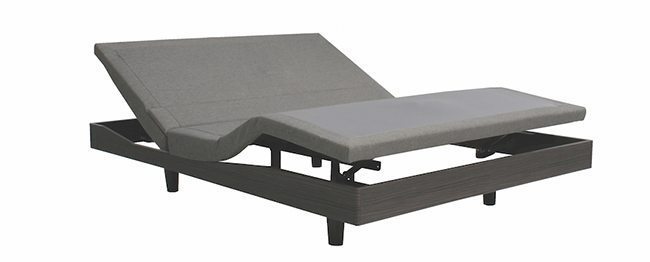
Reverie, based in Bloomfield Hills, Michigan, offers an array of features with the 9T adjustable base, including app-enabled comfort settings and routines that can run automatically, as well as massage and ProGrip technology.
Such a variety of offerings isn’t unusual.
L&P also offers a broad product line that addresses customization, Thompson says. “People are intrigued by different things. You have to be flexible.”
However, the most popular features in addition to the head and foot adjustability are the USB ports and underbed lighting, several say. And while the primary purchasers seem to be baby boomers, younger consumers are making their needs known.
“I think the younger people are definitely wanting the gadgets,” Thompson says. “They do like the apps. They like to be able to control the bed with their phone. They like the USB charging. A lot of beds have A/C power now so you can just plug into them. All those things they use in bed—their phone, their laptop—they like the little comforts of being able to plug things in.”
Changing appearances and technology
In addition to all the new things motion bases can do, the bases also have had a significant makeover in the past few years.
“Aesthetically, these bases used to look different,” Thompson says. “They used to look really institutional with the quilted cover and the silver retention bar and the wired remotes.”
Today, deck-on-deck constructions—a two-piece, upholstered construction—provide a stylish furniture look that appeals to a whole new consumer, says Brent Polunsky, bedding support sales manager for W. Silver Products headquartered in El Paso, Texas. “It’s designed to be the centerpiece of your master bedroom,” he says.
Many manufacturers have discovered ways to remove the retainer bar, which is one more step away from the institutional look.
Reverie, L&P and St. Louis-based Glideaway have added adjustable height legs. On many models they now come standard.
Griggs predicts that over the next two years the industry will see a bigger push toward technology and sleep science. “Those of us in the bedding industry have fought for years to get the consumer to understand that a good mattress can help you sleep better. And we’ve achieved that,” he says. “Now with other products—adjustables being one—people are looking for more health (benefits). People are more health conscious. I think that’s going to be a big focus in the next 18-24 months.”
Reverie is looking toward using technology for health benefits, as well. Its Bluetooth-enabled bases allow consumers to pair their smartphones with their beds, much the way people pair smartphones with their cars. As consumers adjust the base, it gives the remote a precise readout of where they are in the articulation process, Tan says. The app also provides consumers the ability to create “comfort routines” and set a “raise-you-awake” alarm.
“Your bed is no longer static—our current technology can actually provide upgrades down the road as needed,” Tan says. “It’s two-way communication.”
The reason for the technology isn’t so much the “wow” factor, she says. “We want to make sure whatever we’re doing with our technology is improving your habits and improving the quality of your sleep.”
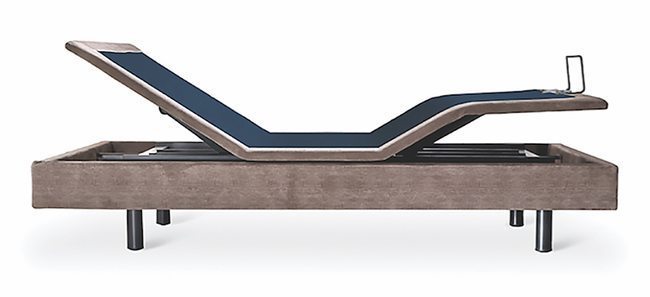
St. Louis-based Glideaway includes this Navigate motion base in its product lineup. The stylish deck-on-deck base has a full range of head and foot tilt positions, preprogrammed zero gravity and anti-snore positions, one-touch flat button and wireless remote.
For your health
While these bases can do an amazing number of things, they were initially designed to make life easier for those with medical needs.
Aaron Goldsmith, president of Postville, Iowa-based Transfer Master Products Inc., keeps that uppermost in mind.
“We want to meet the needs of baby boomers—not just passively, but proactively,” he says. “One out of five people in the U.S. has a disability and is looking for some kind of relief.”
In addition to offering bases that raise and lower the head and feet, Transfer Master produces Supernal Hi-Low, which lowers and rises for those who have difficulty getting in and out of bed.
Goldsmith likes to keep things simple. “We have the least amount of buttons in the industry,” he says.
He believes adding apps to smartphones to control the base is counterintuitive, given that many experts recommend leaving smartphones and other blue-light emitting devices out of the bedroom because they have the potential to disrupt sleep.
“We have simple controls so consumers can have more wholesome sleep,” he says.
That doesn’t mean the company hasn’t evolved through the years. Goldsmith says Transfer Master has made thoughtful changes. Some models feature a wireless remote, even though Goldsmith was initially reluctant to do so in case someone with a disability dropped the remote and had difficulty getting out of bed to retrieve it. And now consumers can resync the hand control by unplugging and plugging the base and pressing two buttons instead of having to crawl underneath the bed and press a button. “We don’t want to create a hurdle,” he says.
For those looking ahead to days when they might have more medical needs, concealed guardrail brackets can be added under the ticking so that it’s available when the time comes.
At the 2016 Summer Las Vegas Market, Customatic debuted the Independence, a twin XL base that can take a person from a prone position into a seated position and can then tip forward to help a person stand. Suggested retail is $1,699.
Sherman says the company is most interested in building beds for the baby boomer market. “Instead of saying, ‘Let’s focus on the millennials, on the younger guy’, we’re saying, ‘Let’s go back for that baby boomer market again, with more home-friendly and more designer-friendly bases to solve a need—the freedom to have mobility without a caregiver.”
At Glideaway, the emphasis is on solution-based products.
“We’re in a sedentary society,” says Dan Baker, executive vice president of sales North America. “We can’t change that, but we can bring products to the marketplace that are going to help that person sleep better whatever their lifestyles are.”
In addition to the traditional head up and foot up models, Glideaway offers two additional models, the Elevation ($2,300) and Ascend ($1,699), which address the needs of side and stomach sleepers, Baker says. The entire base, and not just the head, inclines to help sleepers who have acid reflux or other issues.

Introduced at the 2017 Winter Las Vegas Market, the Stratocaster is Customatic Adjustable Bedz’ newest shippable adjustable base. The Natick, Massachusetts company created the deck-on-deck base with features such as massage, USB outlets, underbed lights and a wireless remote with a built-in flashlight.
The price is right
Perhaps the biggest change in the past few years is a shift to more affordable bases. Each person interviewed mentioned the array of price points as a major trend in the category.
“They’re much more affordable than they used to be,” Thompson says. “You just about couldn’t ever get one for under $1,000. It seems like the sweet spot was in the mid-thousands so $1,500 was more a normal. There’s still a fair bit of velocity in that price point, but really, there’s been a lot more growth south of that in the past few years. It’s not uncommon at all today to see one at $899 or with some more basic features even well below that.”
One way to grow the category is to make adjustable bases more available to more people.
“Price points have moved down to capture a new consumer,” Polunsky of W. Silver says. “We’ve developed a base for less money. On the upper end, we’ve added more features. Everybody is doing more in the master bedroom.”
Others have solved a problem.
Both Customatic and Glideaway have created a single adjustable foundation for a king-size bed. Previously, consumers had to buy two twin adjustable bases for their king mattress. One base means lower cost.
Some models are cost-effective solutions designed for consumers who want the benefits of an adjustable base but need an entry-level price point. Glideaway introduced the entry-level Ecoflex base, which retails between $399 and $599. It’s a simple steel frame with a wider leg. It comes in a four-color shippable box.
Others also are creating lighter bases that are suitable for shipping. Customatic offers Easy Flex, which retails for about $699, and at the 2017 Winter Las Vegas Market debuted Stratocaster, a more fashionable base loaded with features, which is expected to retail between $799 and $999, Sherman says. At the same market, Transfer Master introduced the online-friendly Supernal Snap & Sleep, a base that comes in two shippable boxes, weighing less than 100 pounds each.
“When we look at how the landscape has changed, being able to deliver power bases to the segment of the population who prefer to shop online is important,” Tan says.
She also notes that there has been a shift toward cross-generational purchasers. Not only do these foundations appeal to baby boomers, but millennials and Gen Xers also are looking to put them in their bedrooms.
“We’re seeing a wider uptake of desire for adjustability,” she says. “I think having more price points and product offerings bolster that, but I also think the way we’ve been marketing the product and the reach we’ve achieved as an industry have shifted who thinks a power base is right for them.”
Whether it’s about improving sleep or getting comfortable to watch TV or read, an adjustable base allows you to do all those things, Polunsky says. “It enhances your sleep. It enhances your enjoyment of the master bedroom.”
Baker with Glideaway agrees, saying the master bedroom has become “the second family room, but ultimately, it’s about getting the best rest possible.
“This category will change people’s lives,” Baker says.
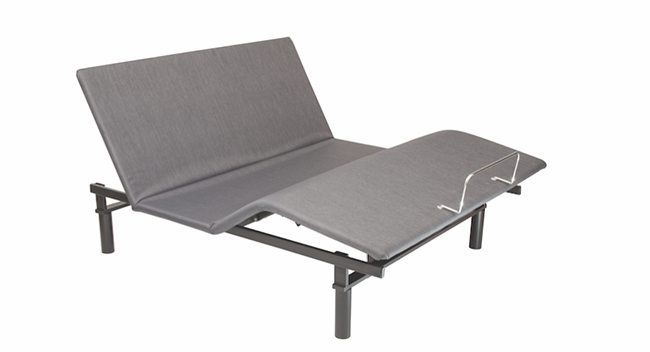
W. Silver Products, headquartered in El Paso, Texas, offers motion bases in a variety of price points. The SS27 pictured is an entry-level base with a full range of head and foot adjustability and wireless remote.
Supplier profiles
Customatic Adjustable Bedz
- Headquarters: Natick, Massachusetts
- Contact: Phil Sherman, managing member
- Phone: 516-455-8000
- Email: [email protected]
- Website: CustomaticBedz.com
Customatic Adjustable Bedz was launched in 2010 by mattress industry veterans Phil McCarty and Phil Sherman. The company sells a wide range of power bases, retailing from $699 to $2,000 in queen.
The product lineup incorporates the latest adjustable-base technology, including Wi-Fi capabilities, Bluetooth sound systems, built-in electrical outlets and USB access ports, LED nightlights, and lounger features that include head-tilt, foot-lowering and lumbar controls.
Customatic customers include major department stores, sleep shop chains and furniture retailers. A significant portion of the business is private-label sales to leading mattress manufacturers and other distributors.
Customers can purchase 110-piece container loads directly from Customatic; those wishing to purchase less than a container, can buy from one of Customatic distributors.
Customatic’s manufacturing partner in Taiwan, Jack Shih, operates a 344,000-square-foot factory in Taichung, employing 280 people.
Ergomotion/Softide from Jiaxing Shufude Electric Bed Co. Ltd.
- Headquarters: Goleta, California
- Contact: Johnny Griggs, chief operating officer
- Phone: 805-403-7002
- Email: [email protected]
- Websites: Ergomotion.us, Softide.com
Goleta, California-based Ergomotion is an adjustable base brand founded in 2005 by engineer Alain Clenet. In 2014, he sold the company to manufacturing partner Jiaxing Shufude Electric Bed Co. Ltd., with headquarters in Jiaxing City, China. Shufude is owned by Jack Tang, who now serves as Ergomotion president and chief executive officer. Following the acquisition, Shufude integrated its Softide adjustable bed brand sales with the Ergomotion operation.
Shufude claims to operate China’s largest adjustable bed factory. The facility spans 150 acres and employs more than 500.
While every Ergomotion base is engraved with “Powered by Ergomotion,” the company’s current focus is on private-label sales to major mattress manufacturers and retailers. It also offers a limited selection of Ergomotion-branded products to smaller independent retailers looking to floor an adjustable base lineup.
Recent product introductions at the 2017 Winter Las Vegas Market include Contour to help people breathe easier. When the head rises, the base elongates. The result is an easier transition for the stomach. Ergomotion also debuted Element, a slim base that’s 3 ½-inches thick.
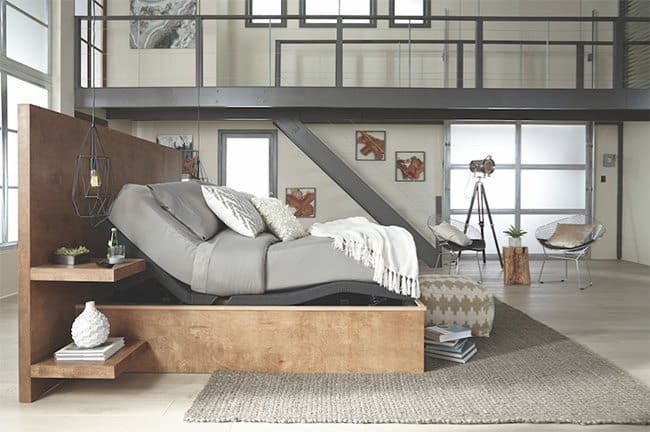
At the 2017 Winter Las Vegas Market, Goleta, California-based Ergomotion debuted its new Contour base, which elongates when the head rises, making adjustments easier on the sleeper’s stomach, the company says.
Glideaway
- Headquarters: St. Louis
- Contact: Dan Baker, executive vice president of sales, North America
- Phone: 314-426-3999, Ext. 286
- Email: [email protected]
- Website: Glideaway.com
St. Louis-based Glideaway is a third-generation, sleep products supplier owned by the Fredman family, specializing in imported mattresses, adjustable bases and sleep accessories. It also offers steel bed frames and accessories and center supports.
Glideaway got into metal bed rails when Harry Fredman patented a slatless rail system in the 1950s. Since that time, the company has obtained several more patents on rail and center support systems.
The company currently imports and sells seven adjustable base designs to retailers under its branded Comfort Base Lifestyle series. It customizes base options for retailers, offers a wide range of upholstery choices and works with retailers on custom packaging and on customer-branded remote controls. Premium product features include massage, embedded Bluetooth speakers, charging stations, A/C outlets and the ability to program and save reclining positions. Retail prices range from $599 to $2,200 in queen.
Glideaway also bills itself as an original equipment manufacturer, selling bases to mattress manufacturers and major retailers for private-label programs. The company creates special programs for these businesses, customizing base features and options, and granting market exclusivity. Product can be purchased by the container or partial truckload.
For e-commerce customers, Glideaway offers a range of product fulfillment choices.
Leggett & Platt Adjustable Bed Group
- Headquarters: Carthage, Missouri
- Contact: Jay Thompson, president
- Phone: 417-358-8131, Ext. 5673
- Email: [email protected]
- Website: LPAdjustableBeds.com
Leggett & Platt Adjustable Bed Group is a division of Carthage, Missouri-based industry supplier Leggett & Platt Inc. The company offers an extensive range of motion foundations that are sold to retail furniture, department and bedding stores nationwide, as well as to e-commerce sites.
Its adjustable bases run the gamut from basic functionality to the top-of-the-line Prodigy 2.0, which features the MicroHook retention system that keeps mattresses from slipping, eliminating the need for a mattress retainer bar. The Prodigy remote uses the latest touchscreen technology; it also has a proprietary app allowing users to adjust their beds via their smartphone or tablet.
At its website, L&P promotes the fact that its lineup of adjustable bases is “designed, engineered and assembled” in the United States.
With that domestic supply chain, L&P can customize its product line to meet the needs of retailers, says Jay Thompson, president of the L&P Adjustable Bed Group.
Reverie/Ascion LLC
- Headquarters: Bloomfield Hills, Michigan
- Contact: Lisa Tan, chief marketing officer
- Phone: 248-409-5652
- Email: [email protected]
- Website: Reverie.com
Founded in 2003, Reverie manufactures adjustable beds, mattresses and pillows that are sold through wholesale channels and directly to consumers. Its sales and marketing headquarters is in Bloomfield Hills, Michigan, with production, distribution and customer service in New York. Reverie manufactures its product line in the United States and in Taiwan.
Its product lineup opens with several starter models and moves up into the T Series. The three top models allow for a wide range of positions and tout such features as advanced lumbar support, underbed lighting and sleek, contemporary frame designs. The majority of Reverie’s lineup features like zero gravity, anti-snore and “high-definition massage” with four wave patterns.
Lisa Tan, chief marketing officer, notes Reverie’s use of technology—both mechanical and electronic—is evolving to keep pace with the changing needs of consumers.
Transfer Master Products Inc.
- Headquarters: Postville, Iowa
- Contact: Aaron Goldsmith, president
- Phone: 563-864-7364
- Email: [email protected]
- Website: TransferMaster.com
Transfer Master Products Inc. has built customized, electric beds for the consumer and health care markets since 1993. Its product line is manufactured in the United States and company headquarters are in Postville, Iowa. Aside from adjustable beds, Transfer Master’s other products include a range of bases, mattresses and accessories for hospitals, sleep labs and other health care settings.
At ISPA EXPO 2016, Transfer Master unveiled the Supernal 5 adjustable bed base, which offers the tilt-up from the foot to assist sleepers with health issues, such as heart or circulatory problems.
The company’s first product, the patented Original Transfer Master Hi-Low was the first bed specifically designed to enable easy transfer from wheelchair to bed.
At the 2017 Winter Las Vegas Market, the company introduced its Supernal Snap & Sleep, an adjustable base that can be shipped in two boxes that are less than 100 pounds each.
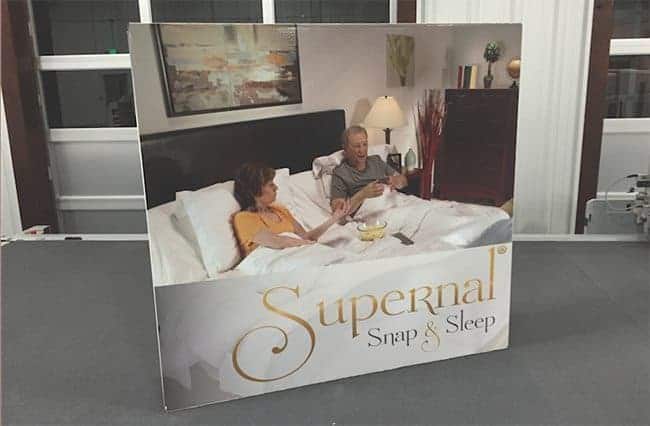
Postville, Iowa-based Transfer Master has introduced Supernal Snap & Sleep, which can be shipped in two boxes for consumers who would like to order adjustability online.
W. Silver Products
- Headquarters: El Paso, Texas
- Contact: Brent Polunsky, bedding support sales manager
- Phone: 915-345-7265
- Email: [email protected]
- Website: WSilverProducts.com, Comfort-n-Motion.com
W. Silver Products is a vertically integrated manufacturer of metal support systems (bed frames, rails, center supports, daybed hardware) and adjustable bases. Its headquarters and a steel mill are in El Paso, Texas.
The family-owned company launched the adjustable bases at the 2016 Summer Las Vegas Market. The units were designed by W. Silver and are manufactured at its plant in Juarez, Mexico.
The company said manufacturing its products at its own factory gives it control over cost and quality from the beginning of the manufacturing process to the end. Products can ship together on one invoice, in a single shipment, offering customers the convenience of one-stop shopping for these items.
Brent Polunsky, bedding support sales manager, notes that it gives the company the advantage of customizing programs.
Its Comfort-n-Motion adjustable base group retails for between $799 to $1,499 in queen sizes. Products are available in several choices of upholstery color and offer a range of basic-to-deluxe features. The bases are sold via wholesale channels only. Product is in-stock and available with a small minimum order.




